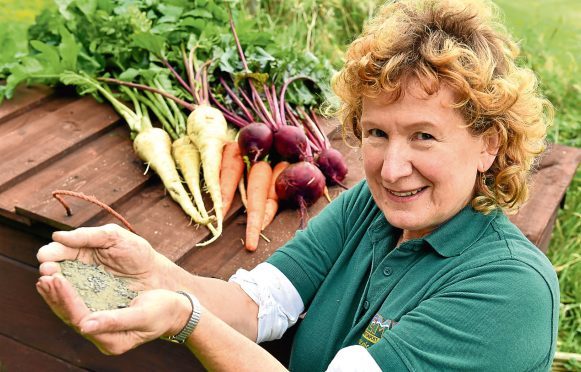The driving force behind an Aberdeenshire-based fertiliser company believes the use of volcanic rock dust on crops and grazing paddocks could transform the businesses of many crofters, farmers and growers.
Jennifer Brodie is the founder and managing director of Banchory-based REMIN – a firm which sources and supplies volcanic rock dust to agricultural and horticultural business across the UK, Europe and beyond.
She said the ancient rock, which was formed more than 360million years ago, is sourced from a quarry in Scotland. It is then finely crushed and screened before being distributed to customers.
Mrs Brodie said the rock dust was rich in minerals, trace elements, macronutrients and micronutrients – all key components to maintaining a healthy soil base.
“I think that the soil has been hijacked by chemistry and by the commercial world of chemistry,” said Mrs Brodie.
“They have missed out the importance of the living organics in the soil from the bacteria to the worms. One soil has passed through a worm, the bioavailability of the minerals and trace elements in the soil is up to 10 times greater.”
She said growers were well versed in knowing that crops grew with the help of nitrogen, phosphorous and potassium.
“But they don’t have the essential minerals and trace elements,” said Mrs Brodie.
“They grow fast and weak so they require lots of pesticides and herbicides. And in doing that it’s killing the life of the soil.”
She said the lack of care for the soil meant many growers were slowly eroding away the goodness of the soil.
“Each time we take a crop out of the ground up to 3% of the turnout of that crop is trace elements. If we don’t put it back we are killing the life of the soil,” added Mrs Brodie.
She believes the use of volcanic rock dust, which carries a similar price to lime, could solve the problem.
The recommended application rate is around two tonnes per acre, and this can be applied to the crop via a lime spreader at any time of the year provided the ground is not frozen.
Mrs Brodie said feedback from allotment owners and small-scale growers suggested the use of volcanic rock dust could eliminate club root, however she does not have scientific evidence to back this up.
“The main benefits are health,” said Mrs Brodie.
“It makes the plants stronger and healthier. People have been taking everything out of the soil and not nurturing it. But this will never replace N, P and K. It will supplement it.”
